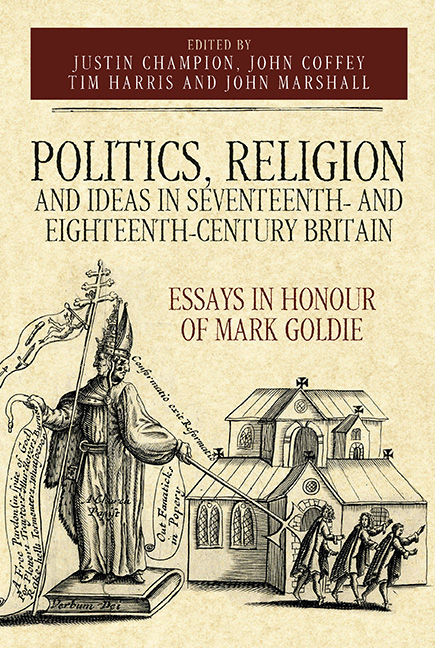 Politics, Religion and Ideas in Seventeenth- and Eighteenth-Century Britain
Politics, Religion and Ideas in Seventeenth- and Eighteenth-Century Britain Book contents
- Frontmatter
- Dedication
- Contents
- Notes on Contributors
- Acknowledgements
- Notes on Text
- Abbreviations
- Introduction: Mark Goldie – An Appreciation
- 1 Constitutional Royalism Reconsidered: Myth or Reality?
- 2 Teaching Political Thought in the Restoration Divinity Faculty: Avant-Garde Episcopacy, the Two Kingdoms and Christian Liberty
- 3 Violence, Protest and Resistance: Marvell and the Experience of Dissent after 1670
- 4 Bulstrode Whitelocke and the Limits of Puritan Politics in Restoration England
- 5 The Assassination of Archbishop Sharp: Religious Violence and Martyrdom in Restoration Scotland
- 6 Compassing Allegiance: Sir George Mackenzie and Restoration Scottish Royalism
- 7 Corruption and Regeneration in the Political Imagination of John Locke
- 8 Locke the Censor, Locke the Anti-Censor
- 9 London, Locke and 1690s Provisions for the Poor in Context: Beggars, Spinners and Slaves
- 10 The Reception of Locke's Politics: Locke in the République des Lettres
- 11 Court Culture and Godly Monarchy: Henry Purcell and Sir Charles Sedley's 1692 Birthday Ode for Mary II
- 12 Thanksgivings and the Signs of the Times: The Apocalypse in the Long Eighteenth Century
- 13 The ‘Secret Reformation‘ and the Origins of the Scottish Catholic Enlightenment
- 14 The Surprising Lineage of Useful Knowledge
- 15 The Vicissitudes of Innovation: Confessional Politics, the State and Philosophy in Early Modern England
- A Bibliography of the Writings of Mark Goldie
- Index
- Studies in Early Modern Cultural, Political and Social History
- Tabula Gratulatoria
1 - Constitutional Royalism Reconsidered: Myth or Reality?
Published online by Cambridge University Press: 12 October 2019
- Frontmatter
- Dedication
- Contents
- Notes on Contributors
- Acknowledgements
- Notes on Text
- Abbreviations
- Introduction: Mark Goldie – An Appreciation
- 1 Constitutional Royalism Reconsidered: Myth or Reality?
- 2 Teaching Political Thought in the Restoration Divinity Faculty: Avant-Garde Episcopacy, the Two Kingdoms and Christian Liberty
- 3 Violence, Protest and Resistance: Marvell and the Experience of Dissent after 1670
- 4 Bulstrode Whitelocke and the Limits of Puritan Politics in Restoration England
- 5 The Assassination of Archbishop Sharp: Religious Violence and Martyrdom in Restoration Scotland
- 6 Compassing Allegiance: Sir George Mackenzie and Restoration Scottish Royalism
- 7 Corruption and Regeneration in the Political Imagination of John Locke
- 8 Locke the Censor, Locke the Anti-Censor
- 9 London, Locke and 1690s Provisions for the Poor in Context: Beggars, Spinners and Slaves
- 10 The Reception of Locke's Politics: Locke in the République des Lettres
- 11 Court Culture and Godly Monarchy: Henry Purcell and Sir Charles Sedley's 1692 Birthday Ode for Mary II
- 12 Thanksgivings and the Signs of the Times: The Apocalypse in the Long Eighteenth Century
- 13 The ‘Secret Reformation‘ and the Origins of the Scottish Catholic Enlightenment
- 14 The Surprising Lineage of Useful Knowledge
- 15 The Vicissitudes of Innovation: Confessional Politics, the State and Philosophy in Early Modern England
- A Bibliography of the Writings of Mark Goldie
- Index
- Studies in Early Modern Cultural, Political and Social History
- Tabula Gratulatoria
Summary
Charles I built up support for his position on the eve of the English civil war, we have long been told, by representing himself as a constitutional monarch committed to upholding the rule of law. According to James Daly, royalist writers of the civil war were ‘at pains to claim that the king's powers were legally limited’: they sought to defend Charles I ‘in his new coat of limited monarchy’, which was ‘the monarchy as overhauled in 1641’. For Conrad Russell, the civil war royalists were not ‘absolutists’ but as ‘attached to the principles of the rule of law’ as their parliamentarian opponents. David Smith, in his book-length study of constitutional royalism, while acknowledging that some civil war royalists remained quite absolutist, pointed to the existence of a significant and influential group – politicians such as Edward Hyde, Viscount Falkland, Sir John Culpepper and the earls of Dorset and Southampton, and pamphleteers such as Dudley Digges, Henry Ferne, John Bramhall and Robert Sheringham – who ‘were united in seeing England as a limited monarchy where royal government operated within the rule of law’. Such views have not gone unchallenged. Paul Seaward, Glenn Burgess, David Scott and Johann Sommerville have all warned against positing too stark a dichotomy between alleged constitutionalists and absolutists, suggesting that the former's constitutionalist credentials can often be found suspect, while even supposed absolutists believed that the English monarchy was in some way limited. Nevertheless, the idea that Charles I repositioned himself as a constitutional monarch from 1642 onwards, and that those who fought for him embraced a vision of monarchy that was limited by law and by the constitution, continues to hold considerable traction. As Richard Cust has recently put it, Charles I on the eve of the civil war ‘set out to present himself as the constitutional monarch par excellence’. Alan Cromartie has written of ‘the royalism invented in 1642’.
From the later-Stuart perspective, however, the political thought of the supposed constitutional royalists does not appear particularly constitutionalist. John Locke, in his Second Treatise, famously complained of ‘a generation of men’ who flattered princes that they had ‘a divine right to absolute power’, endorsed Bodinian notions of indivisible sovereignty and insisted that there were ‘no jurisdictional limitations upon the Crown’.
- Type
- Chapter
- Information
- Politics, Religion and Ideas in Seventeenth- and Eighteenth-Century BritainEssays in Honour of Mark Goldie, pp. 19 - 38Publisher: Boydell & BrewerPrint publication year: 2019
- 1
- Cited by


